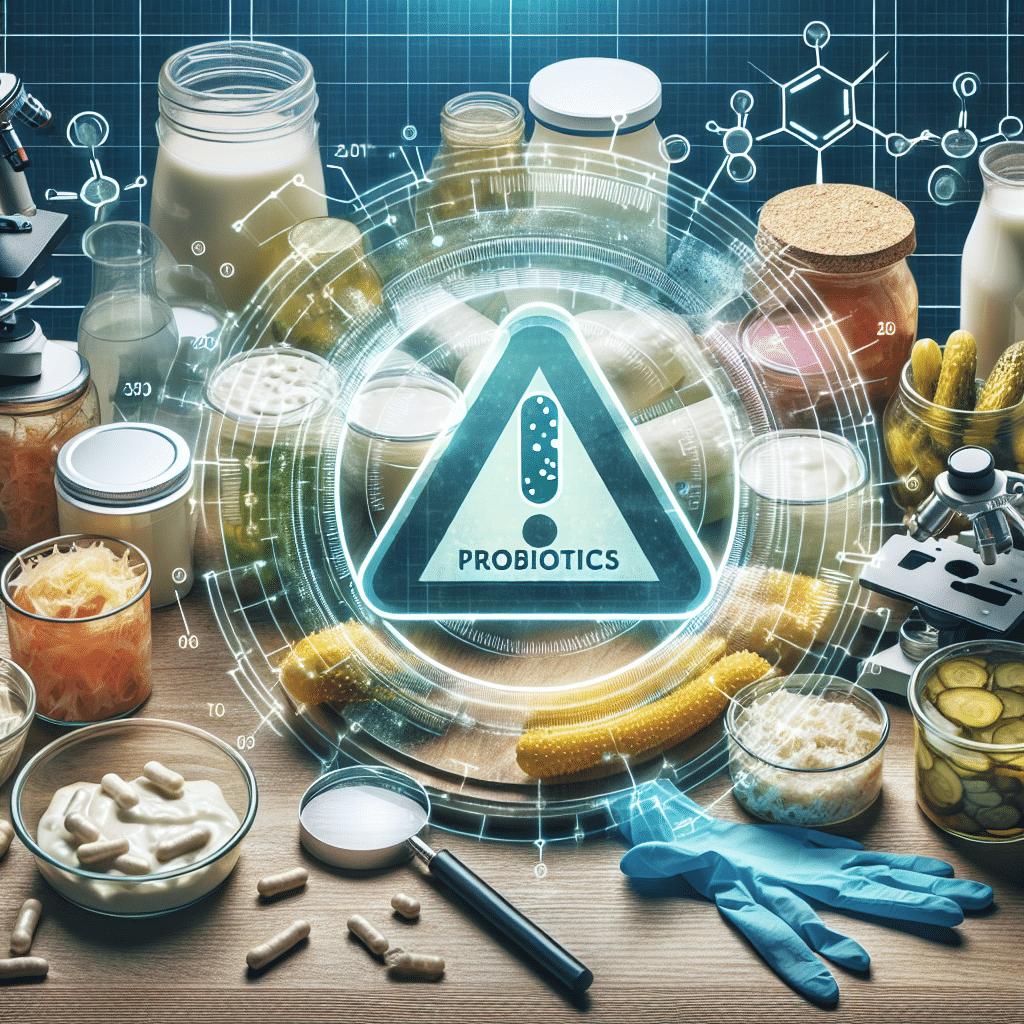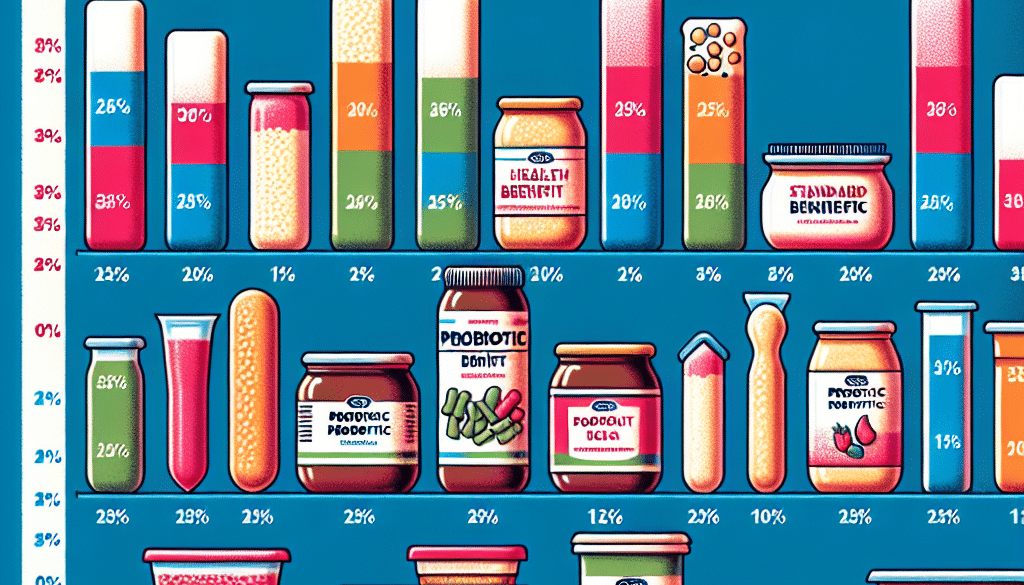Study Shows Many Foods Claiming Probiotic Content Don’t Contain Enough for Health Benefit
-
Table of Contents
- Probiotic Foods Often Lack Sufficient Quantities for Health Benefits, Study Reveals
- The Importance of Probiotics for Health
- Study Exposes Inadequate Probiotic Levels in Foods
- Case Studies and Statistics: The Reality Behind Probiotic Claims
- Regulatory Challenges and Consumer Misconceptions
- Implications for the Food Industry and Consumers
- Conclusion: Seeking Authentic Probiotic Benefits
- Discover ETprotein’s High-Quality Protein Products
Probiotic Foods Often Lack Sufficient Quantities for Health Benefits, Study Reveals

Probiotics have become a buzzword in the health and wellness industry, with numerous food products boasting their probiotic content as a selling point. However, a recent study has raised concerns about the veracity of these claims, suggesting that many foods labeled as containing probiotics may not provide enough of these beneficial bacteria to confer the health benefits consumers expect. This article delves into the findings of this study, exploring the implications for consumers and the industry at large.
The Importance of Probiotics for Health
Before we examine the study’s findings, it’s crucial to understand what probiotics are and why they are considered beneficial. Probiotics are live microorganisms, typically bacteria or yeast, that are similar to the beneficial microorganisms found in the human gut. They are often referred to as “good” or “friendly” bacteria.
Probiotics are believed to offer several health benefits, including:
- Improving digestive health
- Boosting immune function
- Alleviating symptoms of certain gastrointestinal disorders
- Contributing to the maintenance of a balanced gut microbiota
These benefits have led to a surge in the popularity of probiotic foods and supplements, with consumers increasingly seeking out these products to support their health.
Study Exposes Inadequate Probiotic Levels in Foods
The recent study in question analyzed a variety of food products claiming to contain probiotics. The researchers measured the quantity and viability of the probiotic strains present in these foods, comparing them to the levels deemed necessary to provide health benefits.
The findings were startling: a significant number of products had probiotic levels far below those recommended by health experts. Some products contained only trace amounts of probiotics, while others had none at all. The study also found that the viability of the probiotics—meaning the number of live and active microorganisms—was often compromised, further diminishing the potential health benefits.
Case Studies and Statistics: The Reality Behind Probiotic Claims
Let’s look at some specific examples and statistics that highlight the issue:
- A yogurt brand claimed to have “billions of live probiotics,” but tests showed that the actual count was much lower, and many of the bacteria were not viable.
- A probiotic beverage was found to contain only a fraction of the promised probiotic content, with most of the bacteria dead on arrival.
- Statistics from the study indicated that over 60% of tested products did not meet the minimum probiotic threshold necessary for health benefits.
These examples underscore the gap between marketing claims and reality, leaving consumers potentially misled about the health value of these products.
Regulatory Challenges and Consumer Misconceptions
The study’s findings also bring to light the regulatory challenges surrounding probiotic foods. Unlike medications, which are strictly regulated by agencies like the FDA, probiotic foods fall into a gray area with less stringent oversight. This lack of regulation can lead to discrepancies between what is promised on the label and what is actually delivered.
Moreover, consumer misconceptions about probiotics contribute to the problem. Many people assume that any food labeled as “probiotic” is inherently healthy and beneficial, without understanding the specifics of strain, quantity, and viability that determine a product’s effectiveness.
Implications for the Food Industry and Consumers
The study’s revelations have significant implications for both the food industry and consumers. For the industry, there is a clear need for more transparency and standardization in labeling practices. Companies must ensure that their products contain adequate levels of viable probiotics if they are to make health-related claims.
For consumers, the study serves as a reminder to be more discerning when purchasing probiotic foods. It is essential to research and choose products from reputable brands that provide detailed information about the strains of probiotics used and their viability.
Conclusion: Seeking Authentic Probiotic Benefits
In conclusion, the study on probiotic content in foods is a wake-up call for both the industry and consumers. It highlights the need for greater accountability in product labeling and a better understanding of what constitutes a genuinely beneficial probiotic product. Consumers should be vigilant and informed to ensure that they are getting the health benefits they seek from probiotic foods.
Discover ETprotein’s High-Quality Protein Products
While the focus on probiotics is essential, it’s also important to consider the overall quality of your dietary supplements. ETprotein offers a range of superior protein products that can complement your health regimen. Their organic, non-GMO, allergen-free proteins are ideal for those looking to enhance their nutrition with high-quality, plant-based options.
Whether you’re involved in sports nutrition, weight management, or general health and wellness, ETprotein’s products meet a diverse array of dietary needs. With their commitment to purity and excellence, you can trust ETprotein for your protein and nutritional supplement requirements.
About ETprotein:
ETprotein, a reputable protein and L-(+)-Ergothioneine (EGT) Chinese factory manufacturer and supplier, is renowned for producing, stocking, exporting, and delivering the highest quality organic bulk vegan proteins and L-(+)-Ergothioneine. They include Organic rice protein, clear rice protein, pea protein, clear pea protein, watermelon seed protein, pumpkin seed protein, sunflower seed protein, mung bean protein, peanut protein, and L-(+)-Ergothioneine EGT Pharmaceutical grade, L-(+)-Ergothioneine EGT food grade, L-(+)-Ergothioneine EGT cosmetic grade, L-(+)-Ergothioneine EGT reference grade and L-(+)-Ergothioneine EGT standard. Their offerings, characterized by a neutral taste, non-GMO, allergen-free attributes, with L-(+)-Ergothioneine purity over 98%, 99%, cater to a diverse range of industries. They serve nutraceutical, pharmaceutical, cosmeceutical, veterinary, as well as food and beverage finished product distributors, traders, and manufacturers across Europe, USA, Canada, Australia, Thailand, Japan, Korea, Brazil, and Chile, among others.
ETprotein specialization includes exporting and delivering tailor-made protein powder and finished nutritional supplements. Their extensive product range covers sectors like Food and Beverage, Sports Nutrition, Weight Management, Dietary Supplements, Health and Wellness Products, and Infant Formula, ensuring comprehensive solutions to meet all your protein needs.
As a trusted company by leading global food and beverage brands and Fortune 500 companies, ETprotein reinforces China’s reputation in the global arena. For more information or to sample their products, please contact them and email sales(at)ETprotein.com today.














